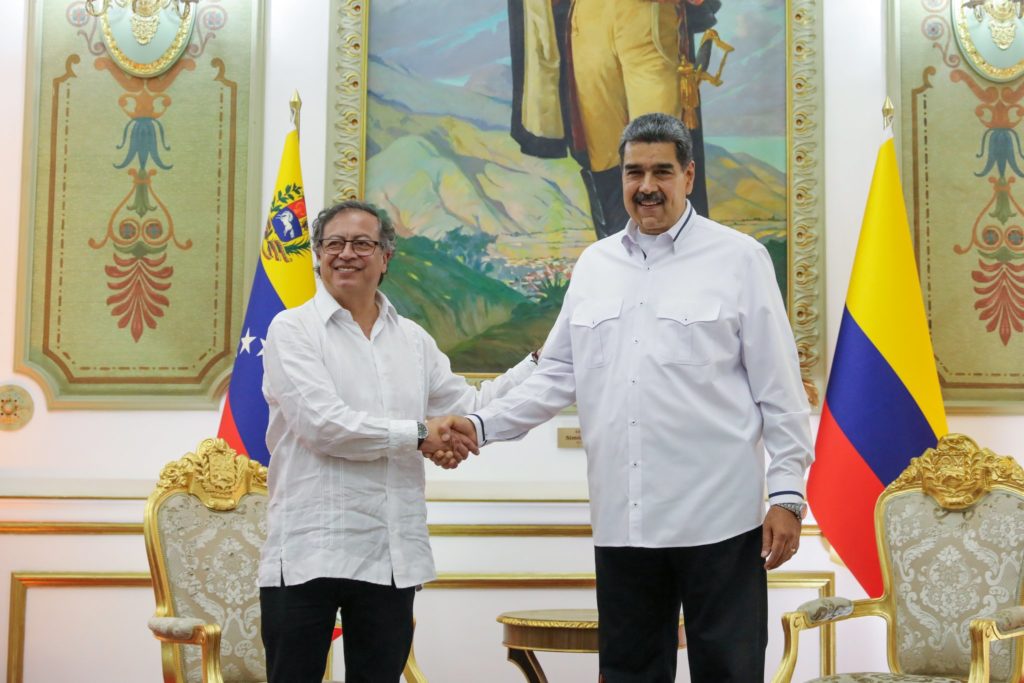
Colombia is driving an agreement to exploit oil in Venezuela. It’s the main agreement resulting from the meeting last weekend between Colombian President Gustavo Petro and Venezuelan President Nicolás Maduro. This was the fourth encounter between the two presidents in Venezuela during the 15 months of Petro’s presidency.
Besides energy issues, the meeting also addressed topics like migration and the environment. In this sense, during the Saturday meeting in Caracas, both leaders committed to accelerating the integration of both countries for these matters.
The joint declaration released after the meeting celebrates the revival of commercial relations initiated earlier this year, expressing the willingness of both states to continue strengthening bilateral trade. Likewise, the possibility of Colombia participating in the exploitation of Venezuelan gas and oil in the coming months was highlighted.
Venezuela’s head of state characterized the four-hour conversation that took place in the Miraflores presidential palace as a “complete success,” where they agreed to open new flights between different cities of both countries, aimed at boosting tourism and facilitating binational migration.
Association between Ecopetrol and PDVSA companies
To explore these resource exploitation options, President Petro mentioned the “likely” partnership between the state oil companies, Colombia’s Ecopetrol, and Venezuela’s PDVSA.
President Maduro expressed support for this Colombian initiative. “This will ensure electrical energy to Venezuela from both sources and fossil raw materials to Colombia,” stated the Colombian president.
This proposal falls within the current context of temporary lifting of sanctions on Venezuelan oil exports, framed within the still fragile agreements between the Venezuelan government and opposition to hold democratic and transparent presidential elections in the latter half of 2024.
However, this temporary relief of sanctions doesn’t include “the drilling, extraction or processing, purchase or sale, or transport or shipment of Venezuelan-origin petroleum or petroleum-derived products.” It also prohibits improvements to wells, other facilities, or infrastructure in Venezuela, or the buying or supplying of goods or services “unless necessary for security reasons.”
Migration and the “humanization of the exodus”
Another prominent topic discussed in the Caracas meeting was Venezuelan migration. Petro proposed the creation of “economic stabilization bonds” for the return of migrants. The president detailed that this measure is part of a program he proposed to the United States for the “humanization of the exodus” of Venezuelan citizens.
“I believe it would be a win-win for everyone, bringing regularization and order to what is currently a disorderly exodus that is violating the human rights of hundreds of thousands of people crossing what we dramatically call the Darien Gap,” remarked Gustavo Petro.
The Colombian head of state did not clarify if the US authorities had accepted his proposal on this matter, especially considering that the US is the main destination for most Venezuelan migrants. Many of them transit through Colombia, crossing the dangerous Darien Gap, the rugged natural border separating Colombia and Panama. According to the United Nations, over 7.3 million Venezuelans have left their country in recent years, with 2.8 million residing in Colombia.
The Colombian president defends the idea that, in the case of sanctions on Venezuela being lifted, the return of its migrants would be largely voluntary.
Energy during El Niño and environmental concerns
Nevertheless, one of Petro’s primary reasons for visiting Venezuela was to discuss greater energy integration that would better address the challenges of the climate crisis and the effects that the El Niño phenomenon, experienced intensely for months, might bring in terms of regional drought.
Most electric energy is generated by hydroelectric plants, and the significant decrease in rainfall experienced in this latter half of the year could jeopardize generation and supply stability.
In fact, the Colombian head of state warned about the drought, which is already a reality and could extend for the next six months, possibly becoming “the worst in history.” Thus, he emphasized the importance of the agreement reached with Venezuela in favor of the “principle of energy integration between the two countries.”
“We will build clean energy projects, where the north of Colombia can transmit abundant electric energy to the west of Venezuela, and we will bring from Venezuela the energy we need to try to maintain the deficiencies that may arise in Colombia,” stated the Colombian president.
“We have proposed here a principle of genuine energy integration between the two countries. It can be expanded to Panama, Ecuador, Brazil. Without fear, we will take steps toward a genuine energy integration between the two countries,” Petro stated after the meeting.
See all the latest news from Colombia and the world at ColombiaOne.com. Contact our newsroom to report an update or send your story, photos and videos. Follow Colombia One on Google News, Facebook, Instagram, and subscribe here to our newsletter.

